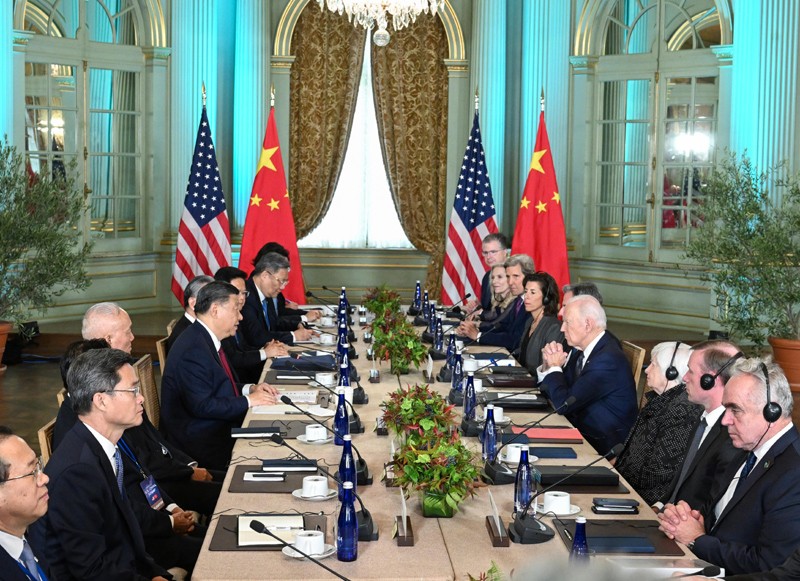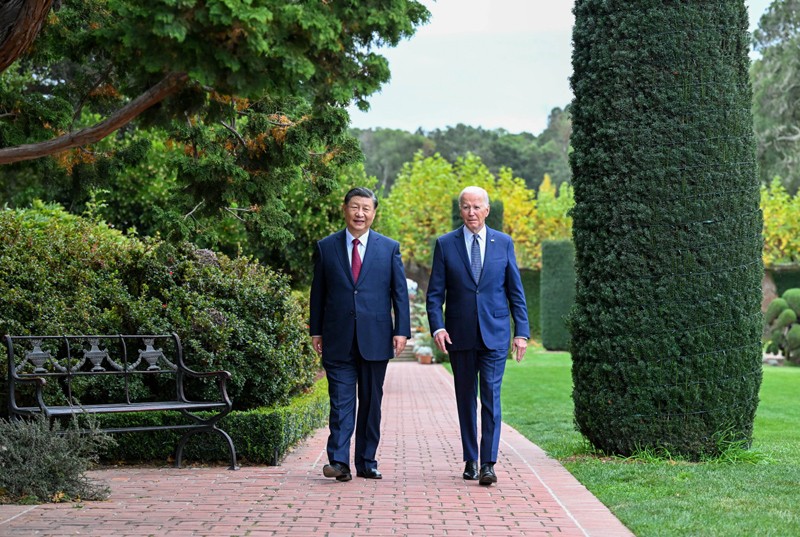On November 15, local time, President Xi Jinping held a meeting between the heads of state of China and the United States with US President Joe Biden at Philorian Manor in San Francisco. The two heads of state had a frank and in-depth exchange of views on strategic, overall, and directional issues related to Sino-US relations, as well as major issues related to world peace and development.
When Xi Jinping arrived at the Philori estate, he was warmly greeted by Biden.

On November 15, local time, President Xi Jinping held a meeting between the heads of state of China and the United States with US President Joe Biden at Philorian Manor in San Francisco. Photo by Xinhua News Agency reporter Rao Aimin
Xi Jinping pointed out that the world is undergoing major changes unseen in a century, and China and the United States have two choices: one is to strengthen solidarity and cooperation, work together to address global challenges, and promote world security and prosperity. The other is to embrace a zero-sum mentality, stir up camp confrontation, and make the world turbulent and divided. The two options represent two directions that will determine the future of humanity and the future of the planet. As the most important bilateral relationship in the world, China-US relations should be considered and planned against this background. It is impossible for China and the United States not to deal with each other, it is unrealistic to want to change each other, and no one can bear the consequences of conflict and confrontation. Great power competition will not solve the problems facing China, the United States, and the world. This earth can accommodate both China and the United States. The success of China and the United States is an opportunity for each other.
Xi Jinping profoundly explained the essential characteristics and connotation of Chinese-style modernization, as well as China's development prospects and strategic intentions. Xi Jinping pointed out that China's development has its own logic and laws, and China is comprehensively promoting the great rejuvenation of the Chinese nation with Chinese-style modernization. China has no plan to surpass or replace the United States, and the United States has no intention of suppressing and containing China.
Xi Jinping pointed out that mutual respect, peaceful coexistence and win-win cooperation are not only the experience extracted from the 50 years of China-US relations, but also the enlightenment brought about by the conflicts between major powers in history, which should be the direction of joint efforts between China and the United States. At this San Francisco meeting, China and the United States should have a new vision and work together to build the five pillars of China-US relations.
The first is to jointly establish a correct understanding. China has always been committed to building a stable, healthy and sustainable China-US relationship. At the same time, China has interests that must be safeguarded, principles that must be defended, and bottom lines that must be adhered to. It is hoped that the two countries will be partners, respect each other and coexist peacefully.
The second is to work together to effectively manage differences. Differences should not be allowed to become a chasm between the two countries, but should be found to build bridges that move in the same direction. The two sides should understand each other's bottom line of principles, do not toss, provoke, or cross the line, communicate more, have more dialogue, and discuss more, and calmly handle differences and accidents.
Third, we need to jointly promote mutually beneficial cooperation. China and the United States share a wide range of common interests in many areas, including traditional fields such as economy and trade, agriculture, and emerging fields such as climate change and artificial intelligence. Under the current situation, the common interests of the two countries have not decreased, but have increased. The two sides should make full use of the mechanisms restored or established in the fields of diplomacy, economy, finance, commerce, and agriculture to carry out cooperation in the fields of anti-narcotics, judicial law enforcement, artificial intelligence, and science and technology.
Fourth, we should jointly shoulder the responsibilities of major countries. Solving the troubles facing human society is inseparable from the cooperation of major countries. China and the United States should set an example, strengthen coordination and cooperation on international and regional issues, and provide more public goods to the world. The initiatives put forward by the two sides should be open to each other, and they can also be coordinated and docked to form a synergy for the benefit of the world.
Fifth, we should jointly promote people-to-people exchanges. It is necessary to increase flights between the two countries, promote tourism cooperation, expand local exchanges, strengthen cooperation in education and disability affairs, reduce negative factors that hinder people-to-people exchanges, and encourage and support more exchanges and communication between the two peoples, so as to lay a solid foundation for the healthy development of China-US relations.

On November 15, local time, President Xi Jinping held a meeting between the heads of state of China and the United States with US President Joe Biden at Philori Manor in San Francisco. Photo by Xinhua News Agency reporter Rao Aimin
Xi Jinping elaborated in depth on the principled position on the Taiwan issue, pointing out that the Taiwan issue has always been the most important and sensitive issue in Sino-US relations. China attaches importance to the positive remarks made by the US side at the Bali meeting. The US side should reflect its statement of not supporting "Taiwan independence" in concrete actions, stop arming Taiwan, and support China's peaceful reunification. China will eventually be reunified, and it will be reunified.
Xi Jinping pointed out that the US has continuously taken measures against China in terms of export controls, investment reviews and unilateral sanctions, which have seriously undermined China's legitimate interests. China's development is driven by innovation, and suppressing China's science and technology is to curb China's high-quality development and deprive the Chinese people of their right to development. China's development and growth have an endogenous logic, which cannot be stopped by external forces. We hope that the US will take China's concerns seriously and take action to lift unilateral sanctions and provide a fair, just and non-discriminatory environment for Chinese companies.
Biden extended a warm welcome to Xi Jinping on his invitation to the United States to attend the US-China summit. Biden said: I had an important meeting with President Xi Jinping in Bali last year. San Francisco was the first place where Chinese arrived in the United States, the place where the United States and China jointly participated in the signing of the "United Nations Charter", and the first place where the United States and China established sister cities. It is of special significance that we meet again face-to-face today in San Francisco, and I look forward to a new consensus and outcome on the basis of that meeting in Bali.
Biden said, I always believe that the U.S.-China relationship is the most important bilateral relationship in the world, that a U.S.-China conflict is not inevitable, that a stable and developing China is in the interests of the United States and the world, and that China's economic growth is beneficial to the United States and the world. Maintaining a stable U.S.-China relationship, preventing conflict, managing differences, and cooperating in areas of mutual interest will help both countries better address each and each other's shared issues. I would like to reiterate the five-point commitment made at the Bali meeting, namely: the United States does not seek a new Cold War, does not seek to change China's system, does not seek to oppose China through strengthening alliances, does not support "Taiwan independence," and has no intention of clashing with China. The U.S. and China are economically interdependent, and the U.S. is happy to see China's development and prosperity, and does not seek to suppress and contain China's development, nor does it seek to decouple from China. The US side adheres to the one-China policy, welcomes dialogue between all departments and levels of the two sides, and stands ready to continue to maintain open and frank communication with China to enhance understanding, avoid misunderstandings and manage differences. The United States is willing to continue to develop economic and trade relations with China, strengthen cooperation in important areas such as climate change, anti-narcotics and artificial intelligence, and is pleased to see that the two countries will increase direct flights and expand education, science and technology exchanges and people-to-people exchanges.
Acknowledging the efforts made by their teams since their meeting in Bali to establish guiding principles for U.S.-China relations, the two presidents emphasized the need for mutual respect, peaceful coexistence, communication, conflict prevention, adherence to the UN Charter, cooperation in areas of common interest, and responsible management of competitive elements in the bilateral relationship. The two Heads of State welcomed the continuation of discussions between the teams on this issue.
The two presidents agreed to promote and strengthen dialogue and cooperation between China and the United States in various fields, including: establishing an intergovernmental dialogue on artificial intelligence; Establish a working group on China-US anti-drug cooperation to carry out anti-drug cooperation; On the basis of equality and respect, high-level communication between the two militaries will be resumed, the working meeting of the Chinese and US defense ministries will be met, and the meeting of the China-US Maritime Military Security Consultation Mechanism will be resumed, and telephone calls between the leaders of the Chinese and US military theaters will be held; agreed to a further substantial increase in flights earlier next year; Expand exchanges in education, international students, youth, culture, sports, and business, etc.
The two presidents underscored the importance of accelerating U.S.-China efforts to address the climate crisis in this critical decade, and welcomed the recent positive discussions between the two climate envoys, including domestic action to reduce emissions in the 2020s, jointly contributing to the success of the United Nations Climate Change Conference in Dubai (COP28), and launching the U.S.-China Task Force on Enhanced Climate Action in the 2020s to accelerate concrete climate action.
After the talks, Biden held a luncheon for Xi Jinping. The two heads of state exchanged views on international and regional issues of common concern, such as the Palestinian-Israeli conflict.
Biden also invited Xi Jinping to walk with him in the Philori estate and personally sent Xi to the boarding place to say goodbye.

On November 15, local time, President Xi Jinping held a meeting between the heads of state of China and the United States with US President Joe Biden at Philorian Manor in San Francisco. This is after the talks, Biden invited Xi Jinping to walk with him in the Philori estate. Photo by Xinhua News Agency reporter Li Xueren
The meeting was positive, comprehensive, and constructive, and pointed out the direction for improving and developing Sino-US relations. San Francisco should be a new starting point for stabilizing U.S.-China relations. The two heads of state instructed the teams of both sides to follow up and implement the new vision reached at the Bali meeting in a timely manner on the basis of implementing the consensus reached at the Bali meeting. The two heads of state agreed to continue to maintain regular contact.
Cai Qi and Wang Yi attended the above activities.